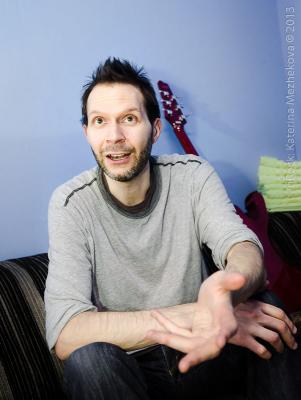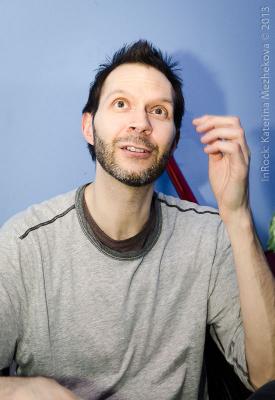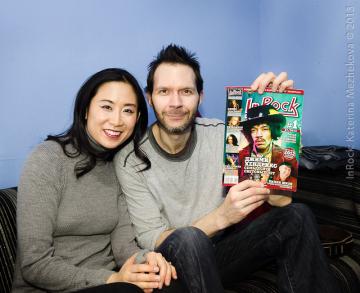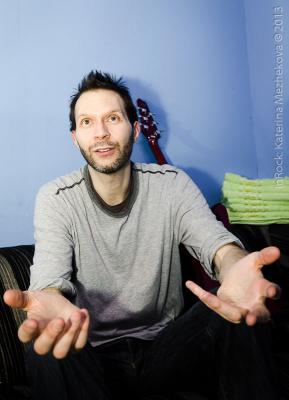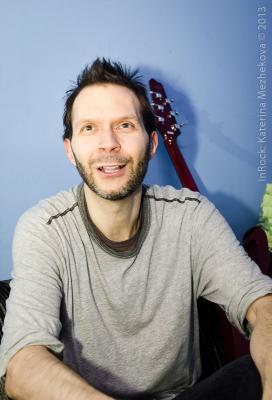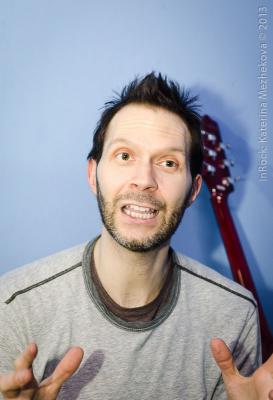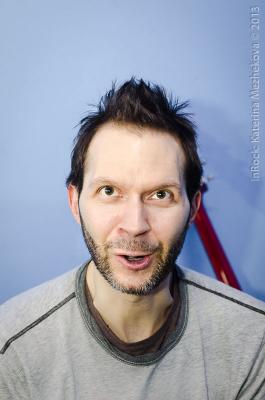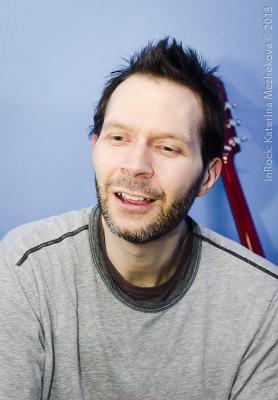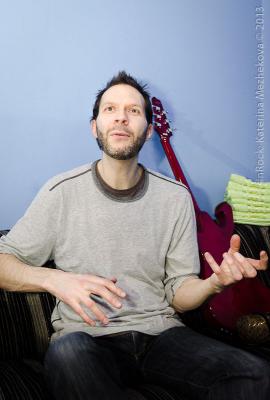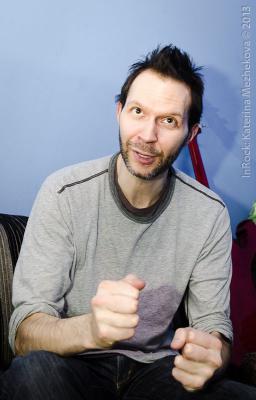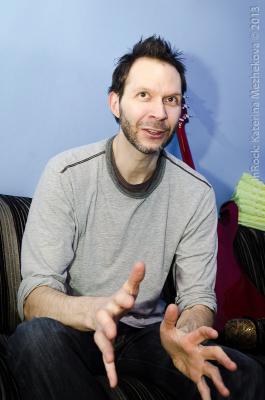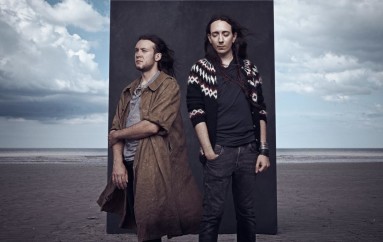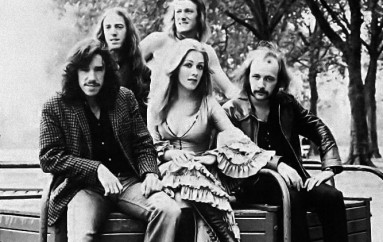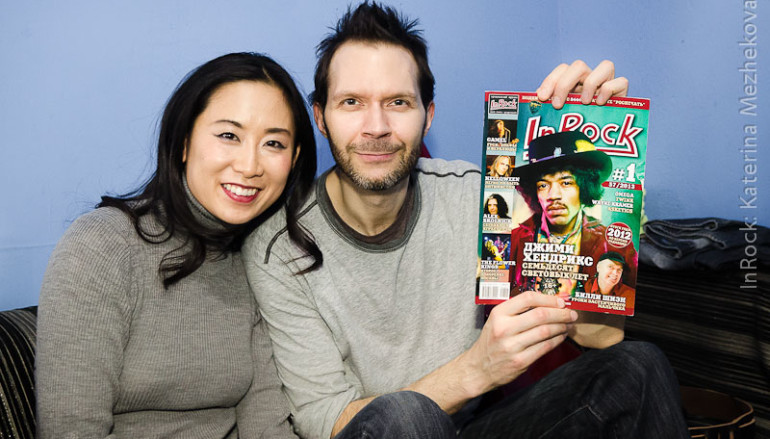
Paul Gilbert: Jazz vibrations
Paul Gilbert succeeds in many roles. He is metal guy in Racer X, radio star in Mr. Big, guitar hero in his solo adventures. Virtuosity is his main claim to fame. Main but certainly not the only.
Paul is not just a guitar player who extends the borders of what is possible to play on the instrument, he is not the circus guy who play with his tongue and God knows what else. He is above all a frontmen, a melodist, an universal rocker with a lot in his gene code – from blues to Broadway, from soul to The Beatles, from Dave Brubeck to heavy metal. Yes, like all schredders, he “speaks” a lot of words, but his words are always in right place, because it serves not a self-portraying of virtuosity, it just allows the music to happen in best possible way. Like it’s said a lot, in his hands guitar is really talking and singing…
Just before Paul’s concert in Moscow we were able to speak with the musician and discuss his current endeavors. How he fulfilled his closet child dreams on fresh “Vibrato” album. How even he, renowned guitar teacher, struggles with learning all subtleties of jazz, and how it helps musician to play metal music. How he made video tutorial and even started his own guitar school. Let’s start!
We are so happy to have you here in Russia! This gig tonight is a part of your Vibrato tour. I can’t help myself but start with the questions about your new album. It clearly showed that nowadays shredding for you is something way more than technique. What was your inspiration for the new record?
With every record I’m doing, I’m always looking for inspiration, I even do a research. I’m always looking for may be some new music I haven’t heard before or that I haven’t explored yet. For this one I did a lot of research about chords. I actually took some guitar lessons from a jazz guitar teacher to learn some new chords that I haven’t learnt before. And that’s really useful for songwriting. So these days, even though I’m a professional musician, I’m still some kind of a student, still learning new things and that helps to inspire me for the new music.
Also the way I recorded the album is much different than before. When I made “Fuzz Universe”which was an album before this one, there was a lot of layering the things together. I recorded small piece of guitar, than another piece of guitar. I did all the little bits, then with the computer I put it together. But this album is much more live. Emi and Kelly, and Thomas and I were just all in a room together, we just played live. That was a lot of fun and much faster to do.
And the first track of the album — “Enemies (In Jail)” — is an excellent example of what you’ve just said. It hooked me as a listener from the first seconds with live energy and good humour. It looks like your childhood memory. What’s the story behind it?
Oh, thank you. May be you’ve heard that story before. When I was a kid I used to write books. My Mom was actually doing the writing, as I was too young to write. I was telling her the words. First I draw the pictures, then I would ask her to write the words. One of the things I wrote was: Happiness is when you get a ride in a racing car and your bad, bad, bad, bad enemies are all in jail. That just really made me laugh! The idea of the small child having his bad bad enemies that he wants to put in jail amazed me. I don’t really remember what it felt like, but it was an interesting memory, so I’ve built a song around that.
Besides you’ve chosen the proper sound for this lovely memory. I don’t recall you using a whammy bar quite often and it fits all the tongue-in-cheek lyrics and the overall mood.
Oh, that’s true! That was a kind of funny experiment too. It all really came together well. And it really helped to play it with the band. I didn’t have the whole ending part until we played it together, then we started jamming and then I started to do that talking part. All laughed. So I thought if they are laughing may be other people would laugh too when they hear it. It all came together spontaneously.
..And the keyboard solo in the end is amazing!
(Paul repeating my words to his wife Emi who are in the same room having some rest before the show)… And the keyboard solo in the end is amazing!
Emi Gilbert: Oh, thank you so much!
“Vibrato” is a good title for an album of the guitar hero. What moved you to call the record like this?
I like vibrato! I remember being a teenager and vibrato to me was like a signature of the professional guitar player. When I first began to play, I tried to bend the strings, but that just never sounded pro in the beginning. I thought: well, some day I’m going to have that really professional controlled sound like all those guys on the records I was listening to, they all had great vibrato. 70s was a great time for that: players like Brian May, Uli Roth, Michael Schenker. Of course, some blues guys, like BB King and Freddie King. I wanted that much more than I cared about playing fast.
I think I’ve become famous as a fast guitar player, but I wanted to show people that there’re other points to it. The riffs of the title track “Vibrato” was actually a challenge to my guitar students. This song has all the things that my students struggle with. They tend to work on the fastness or the scales, and the elements I really encourage them to work on a lot of rhythmic things. It’s a bouncy shuffle in this song (slaps the rhythm from ‘Vibrato” with the hands on his knees) and it’s very syncopated, and it has stops! One of the hardest things for electric guitar players to do is stop, because then you had to turn your volume down, turn your distortion off, etc. There’re tons of stopping in the rhythm part and even in the solo. And of course, it has vibrato. It’ also in the key of B flat, which is a difficult key. To me this song is one of the most challenging things I’ve ever put for the guitar players to do! And that’s a challenge for myself as well!
What is being one of the fastest guitar players for you?
I’m trying to remember where it all started! When I was a kid I liked Jimmy Page and Eddie Van Halen — they did fast things sometimes. You know, just the spirit of the rock music tends to be loud, fast and any element in it is sort of pushed to its highest degree. So when I was a teenager I remembered wanting to play fast, it was my challenge. And then in the 80s when I was first making records and Yngwie Malmsteen and Gary Moore came out so popular, so that was sort of the trend at that time.
And what is now a challenge for you in music?
Challenge for me? Oh, I have a lot of challenges! One of the biggest challenge is using elements of blues and jazz. Rock is usually pretty simple kind of harmony. There are not a lot of chord changes, and even if there are, they are in the same key. For example, we do a jazz tune — “Blue Rondo A la turk” (Dave Brubeck cover — K.M.). Even that it is a relatively simple jazz progression, it is still much more complicated than what I’m used to in rock. So here it has nothing to do with playing fast, it has more of…
… thinking fast!
— exactly! You have one set of notes, then the next chord comes and all those notes become wrong. So you have to learn a new set of notes and you have to make a smooth transition between them. I really love it when it works! But for most rock guitar players, including me, that’s a huge challenge! To me the key is to start with blues. Blues is a great first door to enter to get into that!
Is it also right for improvising and broadens up your palette in other genres?
Oh, absolutely! It helps my heavy metal playing too! Now when I play “Technical difficulties” or “Scarified” I feel that my melodic sense really improved a lot from working on the jazz stuff. So I’m really happy I did that, ‘cause it changed the way I think about music.
Do you think that you will put that into some special jazz for rock guitarists teaching course at some point?
Well, I made my teaching courses some time ago. Anyone anywhere can enter it, since it’s an online school. It is called ArtistWorks. There we have so many styles of teaching. I do the rock teaching. But there’s a jazz teacher, even a fingerpicking course jazz teacher. I tried to do a little bit of that, but mostly I stick to rock. The good thing is that students are really getting better. It makes me very very happy. Well, when I first began to teach, I wanted to teach, but I also wanted to kind of show off, like — Look what I can do! — and so on…
…but you were very very young when you started teaching!
Yeah! And I tried hard to explain things clearly, but I’ve started with really advanced things. It was a support on advancing for a lot of guitar players. This online school I actually do start at the beginning. I tell abou how to tune, how to hold the guitar up to really advanced things. So if you just sit and try to watch the first lesson till the end, it would take you about 15 hours! And that is just the beginning. I’ve done so many videos after that, so there is a lot of material on them.
And you are now arranging the guitar camp, called The Great Guitar Escape?
Oh, yeah! It is coming in July. The last time I did it, there were a couple of guys that came all the way from Siberia! I was amazed! And there were people from all over the world, like Singapore, Chily and of course, from America. The camp I did last year was the first one that I did. Really a challenge to me was to be not just a teacher, but an organizer. I had to contact all the other musicians, make the schedule, figure out what songs we are going to play. And it actually went beautifully! So this time I have a totally new set of teachers, really great people. Andy Timmons will be there, great jazz player Mimi Fox, the guy from Poland named Adam Fulara, who is unbelievable. Also Scotty Johnsson (co-author and instructor of the Berklee online course “Steve Vai Guitar Techniques” — K.M.) and Tonny Spinner (toured with Paul Gilbert, Steve Lukather and Pat Travers — K.M.). So you feel like having a vacation in New York and learning some guitar!
And what you like the most about teaching?
One of my favourite things about teaching is listening to the students. No matter what, if they are beginners or advanced, just the fact of communicating with them is amazing, listening them play and getting into the details of music. I always learn something too. But I’m most happy when they learn and play better and better.
What are your key principles in teaching guitar for the beginners?
I think it is really important to emphasize that it is rock guitar! It has to be a certain sound. The amp usually has distortion, you have a lot of sustain and all that really demands a certain technique, especially for the left hand. And that’s very different from a classical guitar. And a lot of students have a wrong posture, just because they’ve been taught classical guitar first or by habit they developed the wrong kind of the technique. I have to change them to having rock technique. It’s not at all difficult if someone shows it to you. But it’s very important. I met people who were playing like that for like 20 years, still having that classical technique and being in that struggle forever! And in one week I can make them to move their hand a little bit, and that cleans everything up… (turning his left hand around the virtual guitar neck, showing the difference in the hand posture for classical and rock guitar). So that’s the huge thing to be sure it’s rock technique! Well, I can talk about it for two hours, because there are so many elements that I think are very useful in the beginning. The same thing with the course. It’s not just 1-hour video to learn everything and you are not in a hurry. You have time to learn and get into all these details.
Do you think in the beginning it’s better to start with the songs you feel passionate about or just study chord progressions and theory, or mix of both?
Well, to me, the student I would have the most difficult time with would be someone who comes in and says: “I’m a beginner and I want to learn “Scarified”. That’s a hard thing to do, you can’t learn it if you are just a beginner. To me the student I hope for is someone who comes in and says: “I want to learn how to strum a chord and a couple of Beatles songs”, which is actually how I’d begun. That’s the place where you can start and I love that kind of music, simple music as well as complicated music. So I think the best kind of students are people who love all kinds of music and not just one thing, and they can have a good time with a simple stuff as well.
True, indeed! Your solo career is well balanced with your involvement with Mr.Big. What is that balance for you?
We sort of do what we feel like. Of course, Mr.Big has 4 members, so we have to agree on what we are doing. But if we are all in the mood to do it, we come and do it! And in the meantime we are all doing our solo stuff. Eric (Johnson) is on tour in Europe, I’m on tour too, Billy has just formed a band with Richie Kotzen and mike Portnoy (The Winery Dogs — K.M.). I’m not sure what Pat’s doing, but he’s surely up to something too.
Yeah, and we talked to Billy Sheehan several months ago in Moscow (see InRock #57), when he was on his clinic tour with Yamaha.
Oh, you did?! Fantastic! So whenever the four of us go and say “It’s time!”, we will continue. It’s not a seasonal thing, like every winter we’ll do it.
But till the end of this year, is it agreed between you to just do your solo careers?
I don’t even know that far. After this tour, I’m going to go home and rest, have a guitar camp. And then sort of get up and think: what’s next now?! (Emi Gilbert wakes up from a little nap she is having in the same room while we are talking).
For you both as a family, how is it to be on tour together?
First of all, it’s just nice, because Emi plays so well! It’s great having an excellent keyboard player in the band. After that, it’s nice to have someone I like a lot to hang out with. Emy is also very good in discovering the beautiful things in a city. If I’m all by myself, sometimes I just sit in the hotel room and watch Youtube. And if Emi is around, it’s like: we’re in this city for the first time, let’s go see some things. Actually, you should check out Emi’s blog, there’re lots of things from the life on tour and places where we’ve been (http://emigilbert.blogspot.ru/). So my life has very much improved from Emi a lot! (Emi laughing hearing that).
Tell us, please, a few words about other prominent members of your band — Thomas Lang and Kelly Lemeiux?
I’m very lucky, pretty much every musician I’ve played with is fantastic! So I’m very spoiled. Most of musicians who played with Thomas Lang would say you the same — oh, his technique is amazing! And it is! But every drummer I’ve played with has amazing technique. the thing I like about Tom is that he’s a really good improviser. So as we are playing, he will listen to what we are doing, he will adapt to that and make some changes. He’s really a fun guy to jam with! Sometimes you get a drummer who is great at learning things and doing the same every time. And Thomas can do that. But if I say: “Thomas, do what you want, go crazy!” He’s really good at that as well.
And Kelly Lemieux is an amazing bass player! Well, bass is such an interesting instrument to me. Any guitar player can play bass a little bit, it has the same tuning, similar technique. But some people are really bass players. They have a certain feel that is specific to bass. Kelly is like that. Of course, I love to play with him, but I realized it the most when we were doing the live recording. I was mixing it, so I was listening to all bits of the mix — here’s just the drums, here’s just the guitar. And when I turned on the bass part, it just sounded so good! Bass parts and all parts by the others were great, it just sounded like a perfect performance, wow! Because most of the time playing live, I’m concentrating on my own things, but here it hit me, he’s really fantastic!
Emi is stunning as well! All kinds of keyboard sounds, like vintage things, like organs and electric pianos, clavinets. Also her amazing solos and excellent singing as well!
I’ve checked the Youtube video when you all exchange the instruments, that’s a wonderful surprise for the audience!
Yeah, we like to have fun like that closer to the end of the show.
After the show in Moscow, you go to Finland. Do you have a packed agenda now, apart from tour?
Well, after this tour, I have an Ibanez guitar festival in Germany that is happening in the end of June. And the Great Guitar Escape camp in July. Since I have that online school, when I get home I’m always doing videos for the students. Besides that, I would love to just take some lessons again. Every time I have bits of free time, I try to get lessons from someone who teachs a bit different style. Mainly I’ve been taking jazz lessons and I want some more of that. I need to learn some more chords, teach myself some new things and think about what to do next. So my schedule is not overbooked right now. It’s good to have some time to go out there and perform, but after awhile you start to find yourself playing the same thing over and over again. The nice thing about it is that you play it perfectly. But the bad thing is that you start to get bored with it. At this point it’s nice to get home, clear out the brain and put some new things in.
Being on tour, are you now really happy with the live performance you do, playing the tracks from the new album?
Oh, absolutely! First of all, it’s great to have the same band playing it all live as we did it in the studio. I mean when we finished the record, I liked it then too. And I really like the tracks. Several of them are more funky than I’ve ever done before and it’s nice to see people moving in the audience. Because sometimes when I just play fast things, the heads of my audience would be like they are frozen (shows the fan stuck with eyes wide open). And when I play “Vibrato” (hums the tune, slapping his knees in the rhythm), I start to see shoulders moving, heads moving, people smiling, and that feels great!
But we know songs a lot better now! I mean when we played them live in the studio, I’ve just written the songs the day before. So we were trying to remember them, how it all goes, so now we are relaxed a bit. We can just let it flow without thinking like: what part is coming next?!
With you being on tour almost everywhere in the world, I have a wierd question. I’ve noticed that virtuoso guitarists are very popular in Japan, often way more popular than in their home countries. Do you have any idea why is that?
Well, that’s definitely the case for Mr. Big. With my own stuff, I’ve noticed that it’s kind of equal when I’m playing it in Japan, or here in Russia, or anywhere else. But with Mr.Big we had a huge success in Japan, we played in Budokan. And I’m terrible in explaining things like that. There are so many bands in the world and I can never predict which one is gonna be famous. The same is true for my own stuff, I don’t really know why. I just make music I like and how the people will respond to it is completely out of my control. I hope the reason is that we are a great band and we deserve it. But it also might be that we are just lucky or we had the right haircut. But hopefully it’s still in the music!
May be the fans are crazier there, in Japan, aren’t they?
Well, look! Yesterday in St. Petersburg, there was a guy who was really a huge fan, who even came to the hotel to wait for us. I had a feeling that he is a shred-oriented kind of guy. And in the audience, he was the one that I could make his head to move. He was just standing enthralled in the front row of the concert going. Like a statue, just absorbing everything. Well, I’m happy to have any kind of fan, but I just hope to open up the ears of my fans to the kind of music I’m playing, not just looking at how fast I’m doing it. Because I am a musician, not an athlete. But again, I can’t explain why people respond to certain things, that’s way too complicated for me. My brain is busy coming out with the music and that all I can think of!
Text & photos — Katerina Mezhekova
Moscow Hall, Moscow, Russia. 18/04/2012
Thanks to Dmitry Saraev and Marina Lapkina (Riff Entertainment) for arranging the interview.

